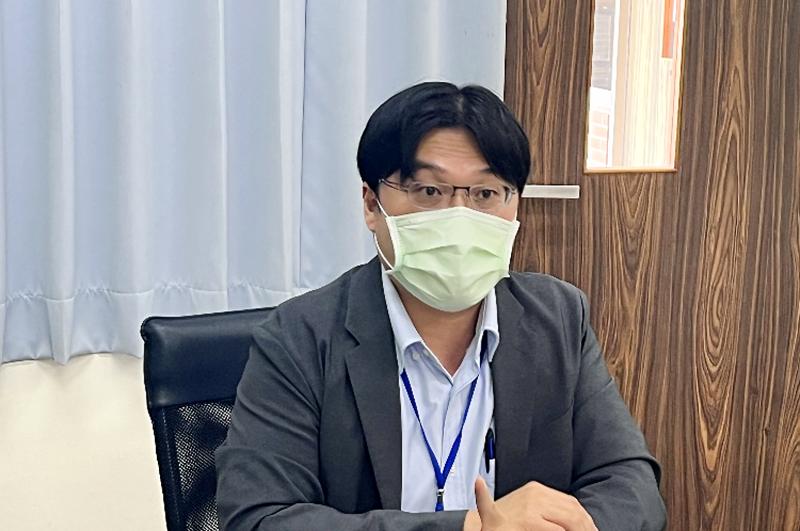A standardized English proficiency test would be developed for universities following quality complaints about privately developed exams, a government official said yesterday.
The Ministry of Education commissioned the nonprofit Language Training and Testing Center to prepare the test, which would be used by 45 bilingual benchmark institutions, Department of Higher Education Director-General Chu Chun-chang (朱俊彰) told reporters on the sidelines of a higher education conference in Nantou County.
The spoken and written portions of the test would be implemented from September next year, while listening and reading would be added from 2024, Chu said.

Photo: Lin Hsiao-yun, Taipei Times
Universities would use the test to assess a student’s ability to take courses entirely in English, he said, adding that institutions not participating in the program may also use it if they wish.
Institutions covered by the benchmark bilingual university program must teach at least 10 percent of graduate courses and 5 percent of undergraduate courses in English.
The ministry has set a target of at least one-quarter of sophomore undergraduates and first-year graduate students at benchmark schools attaining B2-level English proficiency by 2024, Chu said.
In the Common European Framework of Reference for Languages, B2 is the fourth of six levels, indicating upper-intermediate proficiency.
Most universities use English proficiency tests developed by private companies for their graduation requirements, Chu said.
However, this has led to student complaints and even lawsuits over content deemed unsuitable for college students, he said.
The ministry therefore commissioned the center to develop a standardized version, he added.
The center is to work with universities to craft questions that reflect students’ needs, such as books they might encounter in class or internship situations, Chu said.
Taking the test would also cost far less than taking the private exams, at an estimated fee of NT$1,000, he added.
National Sun Yat-sen University vice president of academic affairs Lin Po-chiao (林伯樵) shared the progress of his university, which was chosen for the benchmark program.
Last academic year, there were three departments with 70 students that offered coursework entirely in English, Lin said.
This year, the number has risen to seven departments with 205 students, while 11 departments and 300 students are projected for next academic year, he added.
To assess students’ language ability, the university uses the Test of English for International Communication, he said.
National Chi Nan University has set up a committee with the aim of fostering a bilingual environment, said Chang Chong-chuo (張眾卓), dean of the university’s Office of International and Cross-Strait Affairs.
To encourage teachers to offer all-English courses, each class can receive an additional budget of up to NT$10,000 for preparation time and teaching materials, he said.
Students who advance to a higher level can receive NT$500 to NT$3,000, in addition to other prizes for pursuing an all-English degree, he added.

DEFENDING DEMOCRACY: Taiwan shares the same values as those that fought in WWII, and nations must unite to halt the expansion of a new authoritarian bloc, Lai said The government yesterday held a commemoration ceremony for Victory in Europe (V-E) Day, joining the rest of the world for the first time to mark the anniversary of the end of World War II in Europe. Taiwan honoring V-E Day signifies “our growing connections with the international community,” President William Lai (賴清德) said at a reception in Taipei on the 80th anniversary of V-E Day. One of the major lessons of World War II is that “authoritarianism and aggression lead only to slaughter, tragedy and greater inequality,” Lai said. Even more importantly, the war also taught people that “those who cherish peace cannot

STEADFAST FRIEND: The bills encourage increased Taiwan-US engagement and address China’s distortion of UN Resolution 2758 to isolate Taiwan internationally The Presidential Office yesterday thanked the US House of Representatives for unanimously passing two Taiwan-related bills highlighting its solid support for Taiwan’s democracy and global participation, and for deepening bilateral relations. One of the bills, the Taiwan Assurance Implementation Act, requires the US Department of State to periodically review its guidelines for engagement with Taiwan, and report to the US Congress on the guidelines and plans to lift self-imposed limitations on US-Taiwan engagement. The other bill is the Taiwan International Solidarity Act, which clarifies that UN Resolution 2758 does not address the issue of the representation of Taiwan or its people in

Taiwanese Olympic badminton men’s doubles gold medalist Wang Chi-lin (王齊麟) and his new partner, Chiu Hsiang-chieh (邱相榤), clinched the men’s doubles title at the Yonex Taipei Open yesterday, becoming the second Taiwanese team to win a title in the tournament. Ranked 19th in the world, the Taiwanese duo defeated Kang Min-hyuk and Ki Dong-ju of South Korea 21-18, 21-15 in a pulsating 43-minute final to clinch their first doubles title after teaming up last year. Wang, the men’s doubles gold medalist at the 2020 and 2024 Olympics, partnered with Chiu in August last year after the retirement of his teammate Lee Yang

The Philippines yesterday criticized a “high-risk” maneuver by a Chinese vessel near the disputed Scarborough Shoal (Huangyan Island, 黃岩島) in a rare incident involving warships from the two navies. The Scarborough Shoal — a triangular chain of reefs and rocks in the contested South China Sea — has been a flash point between the countries since China seized it from the Philippines in 2012. Taiwan also claims the shoal. Monday’s encounter took place approximately 11.8 nautical miles (22km) southeast” of the Scarborough Shoal, the Philippine military said, during ongoing US-Philippine military exercises that Beijing has criticized as destabilizing. “The Chinese frigate BN 554 was